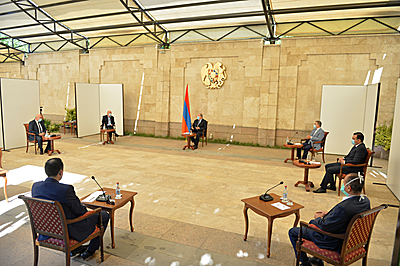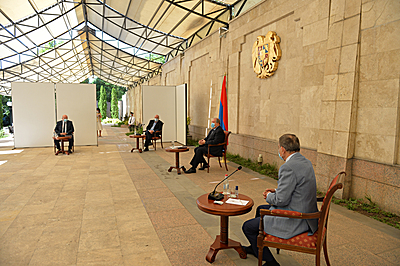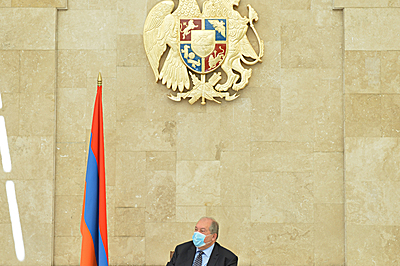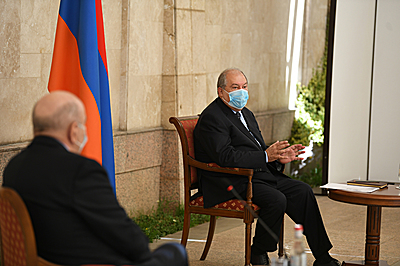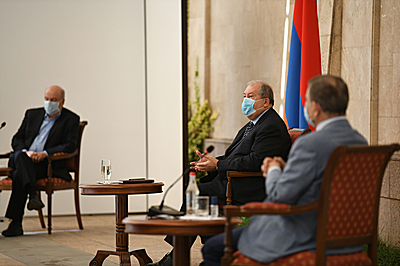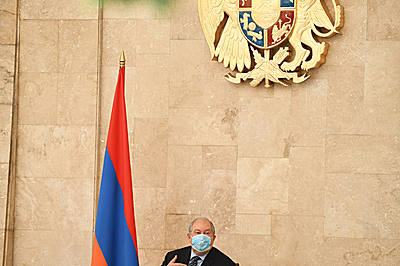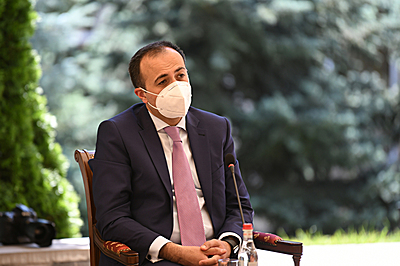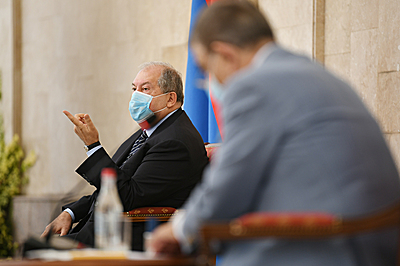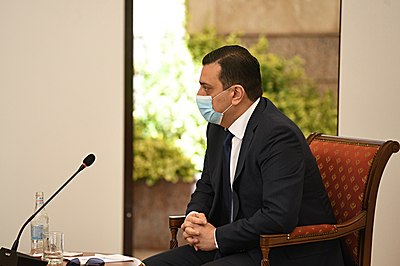Press releases
President Sarkissian held a working meeting with the experts of the healthcare area: Our approaches should be not episodic to solve the existing problem but systemic (augmented)
President Armen Sarkissian held today a working meeting to discuss the situation created by the coronavirus pandemic, measures aimed at its prevention and containment as well as the existing opportunities and in that context to speak about problems of the healthcare system. Present at the meeting were the Minister of Health Arsen Torossian, Scientific Director of Arabkir Medical Center, former Minister of Health Ara Babloyan, Rector of the Yerevan State Medical University, former Minister of Health Armen Muradian, Director of Nork Center of Infectious Diseases Mher Davidian, Director of the National Center for Disease Control and Prevention at the Ministry of Health Artavazd Vanian, Director of the Thoracic surgery department at the Surb Grigor Lusavorich MC Hovhannes Sargavagian, Director of the Astghik MC Asatour Asatrian, and Head of the Cardiothoracic surgery of the same Center Mihir Sousani.
President Sarkissian noted that the purpose of the meeting is to discuss with the responsible representatives of the healthcare system and eminent experts three main issues: the current situation with the pandemic and forthcoming steps, issues related to the management of the healthcare system and how the President and the institute of presidency can assist in the resolution of these issues and in defeating the pandemic.
Speaking of the pandemic, President Sarkissian said in particular, “We can use different words. These words can be dramatic, professional. Nonetheless, the situation is grave. It manifests itself in the number of the infected people and the number of unidentified carriers, who, according to the professional opinion, are much greater in number than we are able to detect. And, of course, the number of seriously ill, and the general overload of the healthcare system, and the number of deaths which for us, for our nation is very painful.
Each of you is a very competent specialist in your own area, thus your opinion is very important for me and for our society and in general, important for making right decisions and moving forward.” According to President Sarkissian, at the moment the country is going through tough times, and the President has to overstep his constitutional authorities and act as a person who can help and assist, particularly through his international connections and abilities. “I am following on a daily basis what’s going on in pharmaceuticals, medical area and I am trying to bring my small contribution by talking to professionals,” the President of Armenia said. “I would like our conversation to have one general title – “Problems of coronavirus in Armenia today and tomorrow,” and I mean one week, one month, two months later. I hope that sometime later, when we reach a peak and will be moving downwards, we will start to think on what the life will be like after coronavirus. If anyone thinks that there will be return to the same life we had before coronavirus, and not only in Armenia, but all over the world, they are mistaken.”
Armen Sarkissian said that for him, also as the President, it is very important to hear in the person of the participants of the discussion an expert opinion. “I’ve been trying to help more vigorously, to bring assistance and that assistance can be in a form of personnel, medications or devises, or even just ideas. I need to know precisely to assist in what and how,” the President said. “If I am going to call the head of a country, or medical center, I have to tell precisely what our country wants. Today’s urgency is the situation we are having; let’s assess it and decide on how to move ahead.
First and foremost, I would like to highlight 3 topics: Firstly, it is a strategy, starting right now. First to speak will be the Minister of Health because he will present the strategy of the Ministry and government, which will translate into a specific plan which in turn will create working programs for separate units – cities or hospitals. The second part which is important is management. It is an essential problem. Why? If the strategy is to make more or fewer tests we can discuss it but problems of management are very significant. The number of beds in the hospitals is close to 1700 or more. Let’s say tomorrow it will be 2000. Do we want more beds or not, can we add more and through what resources? This is one question. Second, which are the main components here? Let’s say we have 2000 beds and I am talking to your partners or professionals in the United States, Russia, or Europe where they have one doctor for up to 20 patients. Let’s say, our number is one doctor for 10 patients. It is my understanding that there exists coronavirus treatment for 3 types of patients. First, young people who go through it easily, all they need is just the advice to stay home; the second is outpatient treatment, and the people who should be in the hospital. In fact, through these months different protocols, i.e. treatment programs, have been developed. If there are 2000 patients and each doctor can treat approximately 10 patients, we are talking about 200 doctors. Why am I telling all this? Because some say that we need doctors, let’s bring them from abroad. I want to get the logic. It’s not a problem for me to call my partners, let’s say in Spain, France, Russia and ask them to dispatch doctors. The doctor arrives to Armenia: what’s he going to do, where will he live, what will he eat? Let’s put it aside for a moment. If he is, let’s say, French, he also needs a translator. I believe that in the current conditions, if we need doctors, we need council, especially for heavy cases. If there is, for instance, a problem with kidneys, the treating physician should ask a specialist. For example, professor Babloyan can give an advice here through different means of communication, or a doctor from Michigan can provide the same advice. Thus, if I, as the President, ask for help, what should I ask for? For 100 doctors to come to Armenia, or rather to connect 100 best doctors from different centers of the world with our centers and receive their professional opinion or advice, or in some complicated cased ask them to share their experience? Second, I understand that the main difficulty will be with helping hands. I mean, the number of nurses, other medical staff might be insufficient. I think we have a large resource in Armenia, one of them, for instance, is the Medical University. If we have students in residency, or graduating students, quite naturally the best experience in their lives will be the participation in these processes. If we are able to send one young specialist to each doctor as an assistant; it will be excellent school for the young people. This will solve two issues: doctors will get some help, students will be educated. The only thing we need to teach young people is how to put on and take off the protective gear because it is the most important issue. We have resources we can use because I know that doctors’ life is tough.”
In this context, the President of Armenia viewed as appropriate that on June 21 – Medical Worker’s Day, doctors and other medical staff receive high state awards. President Sarkissian suggested that the Minister of Health raises this issue with the government. “State ought to appreciate its sons and daughters who in these difficult days put on line their own and their families’ lives,” the President of Armenia said and added that the Presidential Administration in its turn will make certain steps in that direction.
The most important issue according to President Sarkissian is management, “Management should be appropriate and timely, in line with the strategic plan, accompanied with strict discipline and engagement of all available resources. Along with all this, there is also the third issue – assistance, particularly, from the institute of presidency. The Minister will confirm that from day one, at the beginning of March, we have been cooperating on this, and I “connected” the Minister with different institutes in Israel and other countries which have relevant experience. My role is to establish connections and also to appeal to my partners for assistance. Many are ready but we need to be very specific about what we want. Do we want, for instance, artificial ventilation devises, or we have enough, but will need them in a month or two? Do we want masks or not, because we can manufacture them ourselves, or gloves, because they are inexpensive and we can purchase them, gear, certain types of medication: or maybe the most important thing today is oxygen?..
Task me with what you want. I can assure you that thousands of our compatriots, members of the Benevolent council (AGBU) in different countries are ready to help us. But we need to set a task on what we want through remote counseling, if necessary, through a visit. The same goes for our partners abroad. I will give you an example. Days ago, I spoke with the Emir of Qatar, it was his birthday, he’s an old friend of mine. He is ready to send assistance but I need to tell exactly what I want. The leader of the UAE during our conversation expressed readiness to help. I asked the Minister to prepare a list, passed it on, and we received a huge aircraft with gifts. I spoke to the President of Serbia, we are good friends. He said, “We reached a peak, now going down, there is a huge surplus, I am ready to help. I asked the Minister to prepare a list, he gave it to me. This morning, I’ve received a message on how much he can send out, now we are thinking how to bring it in. Same with Montenegro; it’s a small country, no coronavirus, received funds from the EU, have necessary goods, and I believe, they can share. Assistance can be received from China, US, but we need to be very specific. And on this, I need your help.
I would propose our conversation to be professional, medical. If there are painful things to tell, go ahead. I will be the only diplomat in this room. I don’t expect anyone of you to be diplomatic. I am waiting for doctor’s direct words, who will tell the “diagnosis” and will tell what’s good and what’s bad and what’s to be done, staying within the norms of etiquette and tolerant toward each other.”
At the meeting, the President noted also that the world after coronavirus will be different. “The world is already different, we just didn’t see it, it went so fast, many things have changed,” the President said. “Coronavirus became a catalyst or a “cold shower” for the people to realize that we live in a different world, and our problems after coronavirus will be huge, too.” Participants of the meeting, which lasted more than three hours, presented their views and proposals on the containment of the pandemic and improvement of the situation. The heads of medical institutions provided information on the situation, undertaken steps, existing problems and difficulties. The Minister of Health Arsen Torossian thanked the President for the initiative and presented the current situation and measures. He noted that it is always important to hear out opinions of professionals and experts to assess the taken steps, make corrections, and plan for the future. Speaking of the President’s proposal, the Minister agreed that the request should be articulated clearly. “In parallel with the evolving situation, we are making refinements on our needs,” the Minister said and added that previously there was a need for artificial lung ventilation devises, now it is oxygen and they are trying to satisfy the demand through local resources and through importing.
Summarizing the meeting, President Sarkissian went back to some issues. “I agree with your opinion that the situation is temporary and not temporary at the same time because infectious diseases will happen again and we all understand that we need to elevate our healthcare system to a new level. Thus, by making investments in this area we will not lose but gain because we will be able to treat and protect a larger number of people.”
President Armen Sarkissian noted that the situation, regardless of painful consequences, has also some advantages in a sense that a number of countries have already overcome the most complicated part of the pandemic, added new resources and are ready to assist. “Much more affordable instruments and medication will appear on the market, and it is time for us to get them. I believe that small countries have certain advantages. We are small and more manageable. It is the time to change legally our attitude towards the healthcare system. In due time, we will reach a situation when coronavirus will be just a disease – treatable, containable, with all its protocols which will become standard procedures.” He concurred with the observation that virology should be developed to be more prepared for situations like this in the future. “Our approaches should be not episodic to solve the existing problem but systemic. And this, of course, is not only about healthcare. We need to find specifics in the world, a solution which will at the moment work for our country. In that case, we will be successful.” The President agreed also with the viewpoint that there should be trust among all links of the chain. “I heard the word “trust” here which is very important. It is important in public and in interstate relations. It is also true for interpersonal relations. If there is a factor called trust, you can sit down and solve all problems. Trust implies speaking openly, in some cases, asking for forgiveness. Only strong people, individuals and institutions ask for forgiveness. Trust is also education.”
At the conclusion of the meeting, President Armen Sarkissian used the opportunity and addressed all compatriots in Armenia, Artsakh, and Diaspora, “Coronavirus is here, in Armenia, coronavirus is all over the world and the best way to fight it is to observe certain rules,” the President underscored. “Rules are defined by governments, states, they are mandatory, but I ask you to use your sound logic and do more than what’s required from you. Discipline and order is the best medicine as well as responsibility.”
President Sarkissian thanked the participants of the meeting and all doctors, the entire medical staff. “Today, you are at the frontline. And these are not just words. You are today’s heroes, and we all rely on you and you medical institutions which should be medical fortresses. Each of us has to do everything possible so that laboratories and hospitals are protected from diseases. I wish you first of all health, success and wish that you are not only organized but also disciplined. There is no other option.”
